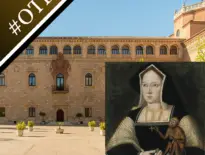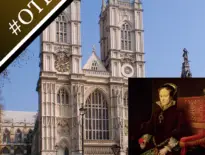On this day in Tudor history, 15th December, Cardinal Reginald Pole, Mary I’s Archbishop of Canterbury and her chief advisor, was buried at Canterbury Cathedral (1558), and Thomas Parry, Elizabeth I's comptroller of the household and loyal servant, died of "sheer grief" (1560)...
- 1558 – Death of James Fleming, 4th Lord Fleming and Lord Chamberlain of Scotland, at Paris. He had been in France as a commissioner representing Scotland at the wedding of Mary, Queen of Scots, and Francis, the Dauphin, and was taken ill with other commissioners after they had told the French that they had no authority to grant Francis the crown matrimonial. Fleming and three other commissioners died, and it was suspected that they had been poisoned.
- 1558 – Funeral of Reginald Pole, Cardinal Pole and Mary I's Archbishop of Canterbury, at Canterbury Cathedral. See video below.
- 1560 – Death of Thomas Parry, Comptroller of the Household to Elizabeth I and Lord Lieutenant of Berkshire. He was buried at Westminster Abbey. See video below.
- 1605 – Death of Sir Francis Gawdy, Judge and Chief Justice of the Common Pleas, of apoplexy at Sergeant's Inn. He had only been Chief Justice for four months. As Queen's Sergeant in 1586, Gawdy had opened the trial against Mary, Queen of Scots. He was buried at Rungton, near Wallington in Norfolk.



I was startled by how “modern” Thomas Parry’s face is. He looks like someone you might meet anywhere today. It is difficult for me to imagine most of the subjects of these portraits out of their century, but Parry could be any century.
I don’t understand what the grief was that killed him. Was it a personal grief or a political grief, or did investments go wrong, or —?
Yes, I find Holbein’s sketches really bring people to life. If you watch the video below the post, I explain how he supported the idea that Elizabeth should marry Robert Dudley but that Cecil opposed the idea. A year later, an ambassador recorded him being taken ill and being “half-ashamed of his doings for the Lord Robert”, so it seems that he fell out of favour with those in power because of his support for that marriage, and took it rather badly.